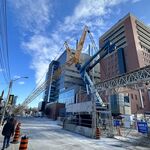whydidimakethis
Active Member
I think if our traffic signals are smart enough they should be able to detect if no oncoming traffic is coming and provide a quick left turn phase during the straight through phase.
Technically they're right, since you're not supposed to enter an intersection unless you know you can clear it before the light turns red, and that's basically impossible in Toronto if you're turning left because of oncoming traffic running the reds.I think this comes down to where a driver was trained (formally or informally). in places with more advanced signalization, I don't think drivers are accustomed to waiting in the middle of an intersection. some cities also explicitly have signs saying not to block intersections.
Knowing you can clear it, doesn't mean taking into allowance those that run yellows and reds.Technically they're right, since you're not supposed to enter an intersection unless you know you can clear it before the light turns red, and that's basically impossible in Toronto if you're turning left because of oncoming traffic running the reds.
Mmm, perhaps, but I'm not convinced. Coupled with being informally told that some schools are teaching it this way.I think this comes down to where a driver was trained (formally or informally). in places with more advanced signalization, I don't think drivers are accustomed to waiting in the middle of an intersection. some cities also explicitly have signs saying not to block intersections.
With the greatest of respect to the Alberta I disagree with a couple of their 'incorrect' movements.
That's not exactly how the legislation reads.Technically they're right, since you're not supposed to enter an intersection unless you know you can clear it before the light turns red, and that's basically impossible in Toronto if you're turning left because of oncoming traffic running the reds.
I don't think that's a good idea, that would basically only allow one car to get through per phase. At least now you could squeeze in two or maybe even three if oncoming traffic cooperates.Of course, I realize that this is not how anyone does it, but it's a reasonable thing to teach new drivers.
It is not just a Toronto/GTA phenomena.Nobody with experience driving in Toronto could reasonably believe that oncoming traffic is going to stop for a yellow light and give them a chance to turn left while the light is still yellow. If you were following this law you'd only move into the intersection when you see an upcoming gap in the traffic.
Of course, I realize that this is not how anyone does it, but it's a reasonable thing to teach new drivers.
In most places in Toronto, I find traffic stops on yellow - it's seldom I see traffic blowing through on a red - and there's always a decent delay here before lights go red in one direction, and green in the other.Nobody with experience driving in Toronto could reasonably believe that oncoming traffic is going to stop for a yellow light and give them a chance to turn left while the light is still yellow. If you were following this law you'd only move into the intersection when you see an upcoming gap in the traffic.
Other than advance lefts, which people absolutely push the hell out of.In most places in Toronto, I find traffic stops on yellow - it's seldom I see traffic blowing through on a red - and there's always a decent delay here before lights go red in one direction, and green in the other.
As a pedestrian, I seldom trap a turning car in the intersection (as a driver I always let them clear). If I do trap them, it's because they are clueless, or they actually entered the intersection on red.
It's rare they don't clear though by the green in the oncoming direction.I think it's actually rare for a light to turn red without a car in the intersection unless traffic is really light.




